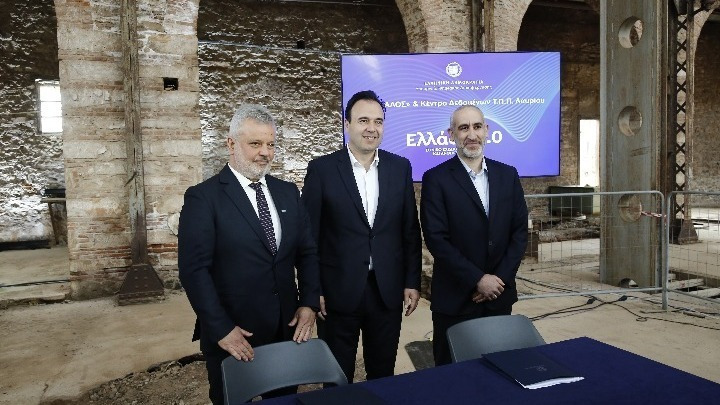Papastergiou announces the launch of work to build Greece's 'Daedalus' supercomputer

Digital Governance Minister Dimitris Papastergiou on Wednesday announced the launch of work to build Greece's new supercomputer "Daedalus" and the Lavrio Data Centre, while speaking at an event at the Lavrio Technological Cultural Park where the new supercomputer will be constructed.
A contract for the construction of the new supercomputer has been signed between the National Network of Technology and Research Infrastructure (GRNET SA), a digital governance ministry agency, and Hewlett Packard Enterprise, following the agreement signed with MainSys SA for the electrical and mechanical equipment and preparation of the space.
The project has a total budget of 58.9 million euros (inclusive VAT) and is among the actions of the Digital Transition Book 2020-2025 for boosting the country's digital infrastructure. It is being implemented by GRNET as part of the Greece's Recovery and Resilience Plan "Greece 2.0" using NextGenerationEU funds via the EU Recovery and Resilience Facility (RRF) and the European High Performance Computing Joint Undertaking (EuroHPC JU) agency.
In a statement at the launch of the project's implementation, Papastergiou said: "From Lavrio, a point from which the 2nd industrial revolution began about 120 years ago, we are making an important step for our position in the 4th industrial revolution and the passage to an era of artificial intelligence. We are methodically becoming established as a pioneering country in the responsible use of AI and emerging technologies. With the development of the supercomputer 'Daedalus' we will possess one of the most powerful computing systems worldwide, on which we will build policies for the country's future, which is directly linked to AI.
"Its construction was, in any case, a key factor in the choice of Greece as one of the first seven European countries that will acquire their own AI factory. Here, where there once was a factory, a new one will be built that is faster, more innovative, with modern infrastructure that will give young scientists a chance to grow and generate groundbreaking solutions. The computing capabilities of 'Daedalus' will operate as a driving force for the growth of the research and business community. It is worth noting that 'Daedalus' will be one of the fastest machines in Europe and the world. Public agencies, universities, start-ups, research centres will be able, using its potential, to develop applications, services and products that benefit the citizens, contributing to the country's growth course. We are proceeding together to the next digital page for Greece on firm foundations, in order to exploit all available opportunities. With the right decisions, AI will take the country forward."
The "Daedalus" supercomputer will be implemented in two stages, through collaboration between GRNET and the two contractors, while the Lavrio Data Centre meets the requirements of the "Uptime Institute", a source for industry tier certification in data centre design, build and operations, regarding its availability and reliability. With a performance of 89 Petaflops, 'Daedalus' will be the most powerful computing system in Greece and one of the most powerful in Europe, greatly enhancing the potential for research and innovation in AI, medicine, meteorology, big data processing and smart transport systems, among others. It has been designed with energy sustainability in mind, using renewables and advanced cooling systems that reduce energy consumption.
It will be 150 times more powerful that the existing supercomputer ARIS and rank among the top 20 of the systems in the top 500 for performance (TOP500) and energy efficiency (GREEN500). It is expected to be available at the start of 2026, boosting Greece's position on the world map for high computing power.
Both 'Daedalus' and the new data centre will be housed in Lavrio Technological Cultural Park of the National Technical University of Athens, in the historic building of the former electricity plant, which is a listed modern industrial heritage monument covering 1,500 square metres. This will serve as the computing core of the Greek AI Factory "Pharos", which will promote technological progress in areas such as health, environmental sustainability, culture and language. The implementation of AI Factory "Pharos" is expected to begin in April.
Other speakers at the event included GRNET Board President Professor Stefanos Kollias, Hewlett Packard Enterprise Managing Director Greece and Cyprus Michalis Kasimiotis and MainSys SA CEO Georgios Plavoukos, EuroHPC national representative Nektarios Kozyris, Lavrio Technological Cultural Park President Dimitrios Kaliabakos, the director of the Democritus IT and Telecommunications Institute Evangelos Karkaletsis and the digital governance minister's legal advisor Vasilis Karkatzounis.


















































































